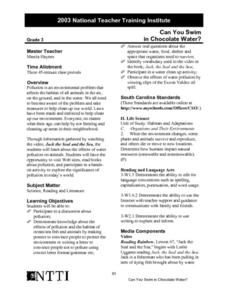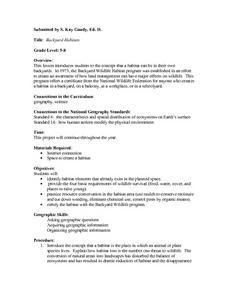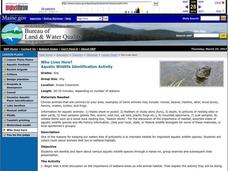Curated OER
Can You Swim in Chocolate Water?
Third graders discss water pollution and its affects on animals. They watch a demonstration using a plastic fish in a fish bowl in which various types of water pollution are illustrated.
Curated OER
Backyard Habitats
Students identify habitat elements. They create a habitat in a backyard, on a balcony, at a workplace, or in a schoolyard and provide the four basic requirements of wildlife survival (food, water, cover, and places to raise young). They...
Curated OER
Which Animal Lives Where?
Use this lesson in your classroom for a quick and easy way to review animal habitats. Young children use magazine clippings, pictures provided, or other resources to create a collage depicting an animal habitat. This is a great way to...
National Wildlife Federation
What's Your Habitat?
How do human habitats compare to animal habitats? Individuals begin their nature discovery by drawing their own habitats that extend beyond their houses. Pupils ensure their drawings include the four habitat elements of food, water,...
Alabama Wildlife Federation
How Many Butterflies
Learners become butterflies to complete an activity that has them collect tokens that represent food, water, and shelter. They must collect their necessities while in competition with other butterflies in the same area. Once the...
Curated OER
Water Snails
Students study water snails. In this water snails instructional activity, students research the habitats of water snails. After conducting research, students investigate water snails in their habitats and generate scientific observations.
Curated OER
Water, Water Everywhere (Pond Animals)
Second graders examine the characteristics of animals who live in a pond environment. In groups, they describe the various stages in the life of a frog and identify the characteristics of other pond animals. Using this information,...
Curated OER
Water Wonders
Students explore hydrology concepts. In this environment and biology instructional activity, students identify and describe macroinvertebrates using a variety of pictures and resources. Students observe and write about a classroom...
Curated OER
Habitat Basics
First graders get out and explore two different habitats to examine how each one meets the needs of the plants and animals that dwell there. They discuss what they've learned about animal habitats as they explore the outdoor environment....
Curated OER
Where Did They Come From?
Give science learners nine questions about the biogeography of hydrothermal vents and turn them loose to research this fascinating habitat. Working in cooperative groups, they prepare a report that addresses each of the questions. A...
Curated OER
Water and Sanitation
Learners examine water contamination problems. In this global studies lesson, students compare and contrast water sanitation issues on Malawi, Tanzania, and Ontario. Learners propose solutions to the water sanitation problems.
Curated OER
Habitats
Students examine how different living things interact with their environment. As a class, they discuss the characteristics of a habitat and write the list on the board. In groups, they focus on one habitat and create a mural of the...
Curated OER
Vacancy: Habitats Available!
Sixth graders pick a native animal and write a classified housing ad to match the animal's habitat requirements, paste it on posterboard and then try to match each habitat with the animal it represents.
Curated OER
Habitats: must live with them....cannot live without them.
Learners conduct an internet study regarding habitat, ecosystem, biome and the region they live in. They observe the habitat by visiting a State Park and observing the organisms in their habitat. In addition, they create their own...
Curated OER
Lesson: Sand and Water
Students review background information about water tension and adhesive forces on sand. In this sand science lesson, students visit a beach and have a sand building competition near water and away from it. Students discuss water tension...
Curated OER
Anchialine Cave Species
Ever heard of a stygofauna or a stygobite? How about an anchialine cave? Set your young biologists on a quest to find information about organisms that live in and have adapted to life in caves located near the water. Class members then...
NOAA
Fishy Deep-sea Designs!
Oceans represent more than 80 percent of all habitats, yet we know less about them than most other habitats on the planet. The instructor introduces the epipelagic, mesopelagic, bathypelagic, twilight, and midnight zones in the ocean....
Curated OER
Flutterings and Flowers
Fourth graders investigate the significance of natural resources and the habitats of butterflies. They create a list of their own favorite foods, then watch a video about habitats. Students identify things in the video that animals and...
Curated OER
Who Lives Here?
Students identify various aquatic wildlife species. In this biology lesson students collect clues about animals that live in wetland habitats. Students rotate through several stations displaying particular animal species to collect their...
Curated OER
World of the Pond
Field trip! The class will review what they know about organisms that dwell in freshwater ponds, then trek down to the old water hole to collect specimens for examination. This includes several web links, useful tips, and an excellent...
Curated OER
Data Analysis: bird habitats in rice farms
Fifth graders make a graph and write an essay to interpret the data of birds that take advantage of habitats near rice farms. In this data lesson plan, 5th graders calculate the information given to them and interpret it in an essay form.
Curated OER
Habitats and Components School Forest Lesson Plan
Second graders go on nature scavenger hunts. In this nature scavenger hunt lesson, 2nd graders explore the natural habitat of their school grounds and make observations regarding the objects and animals they find in the air, on the...
Curated OER
Freddy the Fish
Students complete an experiment. In this water pollution instructional activity, students brainstorm information about river habitats and water pollution. Students then read the story Freddy the Fish and complete an experiment...
Curated OER
Salt Marsh in a Pan
Students create a model of a salt marsh to discover the impact of pollution and human activities on water-based habitats including bays and the ocean. They recognize the relationship between natural and developed areas. Students impact...
Other popular searches
- Animals Water Habitats
- Animal Water Habitats
- Land or Water Habitats
- Shallow Water Habitats
- Water Habitats Lesson Plans
- Describe Water Habitats
- Water Habitats Rivers

























